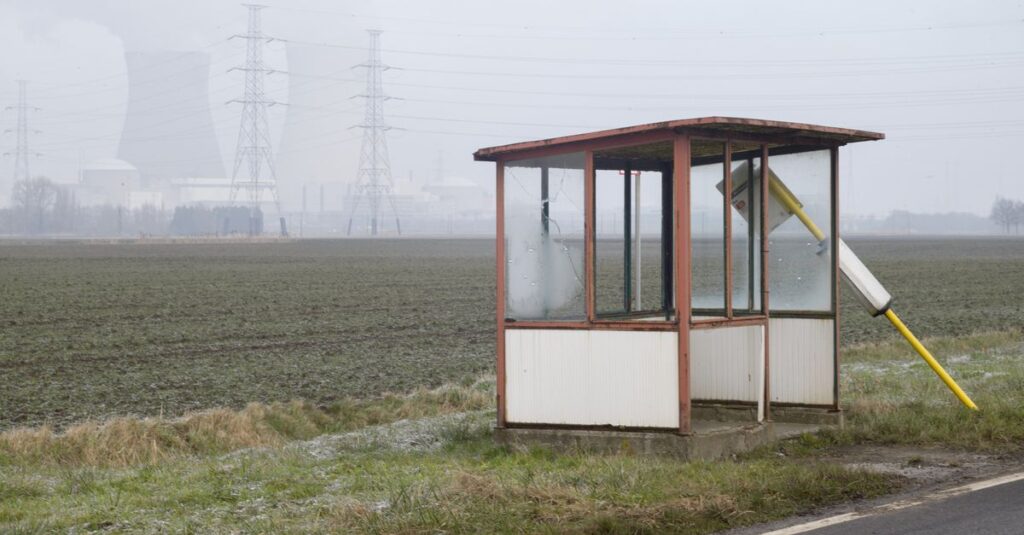De friendly person by Marc Kregting (1965) is a small epic about a Polish migrant who, after the fall of the Wall, settled in ‘Patatonia’, where he works at Senseo Planvacuüm, a caterer who serves ‘fair / food’.
Patatonia is Kregting’s version of Belgium, with a touch of the Netherlands, ‘where all mobility / for humanity without a motor / is dependent on lanes and cobblestones’. In Antverpia at night, where there was so much drinking that ‘it was reasonably impossible’ to get up, the poet met the best man or the ‘friendly person’ who searches ‘for his point / of view, in the break from his job to which / the drive economy goes up’.
One of the energy guzzlers is the persistent bureaucracy that thwarts the migrant:
The first envelope was blue, the kind person remembers, and what the thing revealed was language that was beyond him despite the years while heaven intended to help, and the bottom line turned out to be money, shells, rightful consideration for what was in that language was called a handful of cash […].
Because the authorities did not find him at home, he had to report his existence. Once identified in the systems, there is no escaping it, just as in this passage you cannot avoid thinking about the ongoing Benefits Affair.
After his flight west, the friendly man hoped for a better life, but the country of arrival also turns out to be a banana republic. He feels neglected at work. Colleagues his daughter’s age are more concerned with nail polish and the meatballs are ‘now mainly vegetarian’. He finds the only support in the nurturing of his teenage daughter, who increasingly chooses her own path and knows how to navigate much better in contemporary society.
The friendly person is one long poem of more than seventy stanzas, often consisting of one continuous sentence. Just before the end you will find a crucial passage in which the fate of the friendly person in contemporary society and Kregting’s skills as a poet come together. The Pole has now been fined, but that does not surprise him:
[het] suited his fate, the kind man became thirsty for thoughts, we will learn and learn, his/whose/whose legend, what does it mean other than a bow tie, and thou shalt have no God should in case you forgot my commandments, the hiccups , greetings, meshed the best clothing, tickling with misery n’est-ce pas.
The sentence shoots in all directions: a menu of options pronounsalthough not the contemporary variants (which you will find elsewhere in the collection), follows directly on from a line by Paul Celan, taken from the beautiful poem ‘The years from you to me’: ‘We look at ourselves in the mirrors of the deep sea and offer each other / some more food: / the night is the night, it begins with the morning, / he lays me next to you.’
Then a jumbled Biblical commandment and some curses pass, after which it ends in French.
In fact, each stanza is constructed like this: Kregting strings together anything and everything – from snake to mysterious metaphors – together in unruly sentences. Admittedly, it is not easy reading, because the density of references, action and meaning is high. I too was sometimes at a loss, as in this passage: ‘The kind person has been called, there were no better ones, she/her, hearing a nice pussy again, multi-lingual, Babel-worthy, bite marks, Pentecostal slot, / lie down for a while, wring the piglets, an ear between his teeth, hole in the hickey, toffee’.
How does this all fit together? Who owns the bite marks? What is a Pentecostal slot? The surrounding stanzas offer no solution, because they raise their own questions and suck you into their own logic. What I do know, however, is that this passage took me by surprise because of the nice rhythm and the play with long and short sounds. The pleasure of language is contagious and paradoxically provides a more relaxed reading experience, because you don’t have to figure everything out.
The story loses out here against Kregting’s language bombast and craftsmanship, but he seems to have taken that into account, as the friendly man ultimately comes off badly: ‘He was only a Pole and now he is dead. / Thank you very much for sorting the friendly person separately / with the waste.’ His end comes abruptly, too abruptly in fact. Isn’t that indicative of the throwaway society we live in? Is that the fate of the migrant? The answer must be affirmative, given the short ominous sentence with which Kregting The friendly person ends and which, in addition to a bitter aftertaste, also makes you thirsty: ‘Or stop and do something’.
